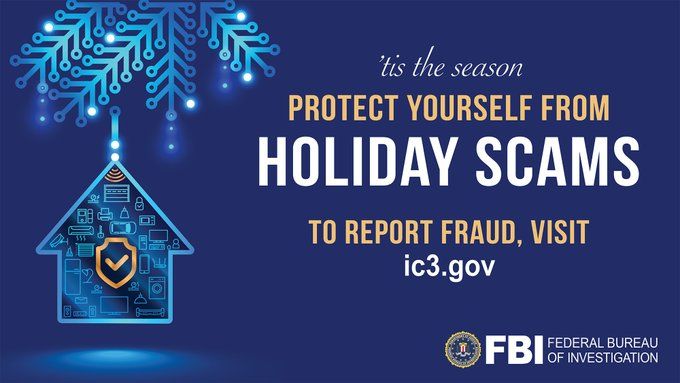
Be forewarned about the currently trending online holiday shopping scams

Yesterday, the FBI issued a warning to online holiday shoppers regarding scam trends that are currently in play and also warned us all to remain vigilant when purchasing items online. The FBI anticipates increased fraud schemes designed to steal consumers’ money and personal information this year. Criminals are increasingly creative in their efforts during the holiday season and will aggressively try various ways to prey on unsuspecting shoppers.
A non-delivery scam is where a buyer pays for goods or services they find online, but those items are never received. Conversely, a non-payment scam involves goods or services that are shipped or provided, but the seller never receives payment.
According to the FBI’s 2021 Internet Crime Report, the Internet Crime Complaint Center (IC3) received a combined 108,869 complaints of non-delivery/non-payment crimes in 2021, totaling over $337 million in losses to victims. Credit card fraud accounted for another $173 million in losses. So far this year, IC3 has already received over 44,220 complaints across the U.S. with losses of more than $276 million from January 2022 to October 2022.

Local Examples, San Francisco:
Within the 15 counties covered by the FBI’s San Francisco field office, over 2,100 complaints were reported to IC3, with a combined loss of more than $8 million in non-payment or non-delivery scams last year. Santa Clara County had the highest dollar amount losses and number of complaints by victims of this scam, followed by Alameda County, then San Francisco County in dollar amount losses last year.
In Alameda County, while the number of victim complaints decreased from 2020 to 2021, the dollar amount loss has increased over the last few years. So far this year, Alameda County’s dollar amount loss, nearly $2 million, has already exceeded the previous year’s total losses.
The FBI also anticipates a higher loss in funds with investment scams this year, primarily due to the significant increase in “Pig Butchering,” which involves the investment in virtual currency. “Pig Butchering” scams occur when a scammer fosters a relationship with a victim they’ve met online and then convinces that victim to invest in cryptocurrency to take advantage of potential high-yield returns. The scammer will direct the victim to websites that appear authentic but are controlled by the scammer instead. After the victim makes several cryptocurrency investments through these fake sites, which purport significant returns, requests by the victim to withdraw their investments get denied. Then the scammer vanishes, cutting off contact with the victim, taking the invested sums with them.
Other Scams to be Mindful of this Season Include:
Online Shopping Scams: Scammers offer deals through phishing emails or advertisements.
Social Media Scams: Scammers use social media sites to offer holiday promotions, vouchers, or gift cards by completing surveys designed to compromise your personal information.
Gift Card Scams: Victims receive a spoofed email, call, or text asking them to purchase multiple gift cards for personal or business reasons.
Charity Scams: Criminals set up fake charities and profit from persons who believe they are donating to a legitimate organization.
Smartphone App Scams: Scammers design mobile apps designed as free games that steal your personal information.
There are certain red flags holiday shoppers can be aware of and guard against this holiday season.
“We want the public to know there are actions they can take to mitigate their chances of being victimized by an online scam,” said FBI Special Agent in Charge Robert Tripp. “The FBI encourages consumers to treat online shopping as they would walking into a physical location – be aware, be alert, and safeguard your personal information and finances.”
Tips to Avoid Being Victimized
- Before shopping online, secure all financial accounts with strong passwords. Use different passwords for each financial account.
- Don’t click suspicious links or attachments in emails, websites, or social media. Especially those asking for a password or financial data. This also may result in unknowingly downloading malware to your device.
- If a company asks you to update your password or account information, contact the company on your own using information from their official website.
- Be wary of online retailers offering goods at significantly discounted prices. If a deal seems too good to be true, it likely is.
- Beware of purchases or services that require payment with a gift card.
- Use a credit card vs. a debit card to make purchases and check credit card statements routinely.
- Make charitable contributions directly rather than through an intermediary and beware of organizations with copycat names similar to reputable charities.
- Always get tracking numbers for items you buy online, so you can make sure you can follow the delivery process. Track your order through your original confirmation email.
–
What to Do if You Are a Victim
Contact your financial institution immediately upon suspecting or discovering a fraudulent transfer.
Victims of holiday scams are encouraged to file a complaint with the FBI at ic3.gov.
For more info on how to avoid getting scammed while shopping online this holiday season, see the video accompanying this article.
(Source: FBI / San Francisco)
Posted by Richard Webster Ace News Today / Follow Richard on Facebook and Twitter






